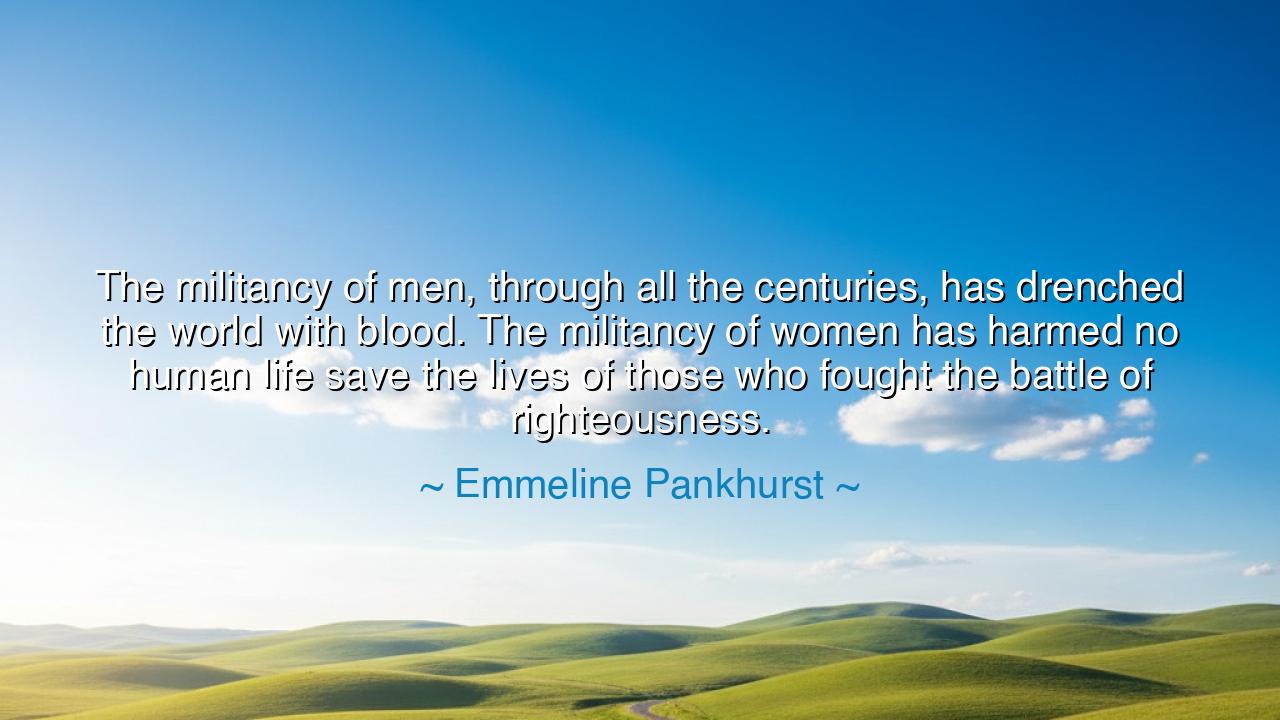
The militancy of men, through all the centuries, has drenched
The militancy of men, through all the centuries, has drenched the world with blood. The militancy of women has harmed no human life save the lives of those who fought the battle of righteousness.






Hear, O guardians of memory, the words of Emmeline Pankhurst: “The militancy of men, through all the centuries, has drenched the world with blood. The militancy of women has harmed no human life save the lives of those who fought the battle of righteousness.” This is no passing remark, but the cry of a prophetess, forged in the fire of struggle. It is the voice of one who beheld the ruin of war wrought by men’s militancy, and who dared to raise the standard of a different kind of battle—one waged not for conquest, but for justice.
For indeed, the militancy of men has long been etched into the chronicles of time. From the fields of Troy to the trenches of Flanders, men have lifted the sword in rage, ambition, and pride, leaving nations in ashes and rivers red with blood. Their militancy has been a fury without end, measured by the graves it filled and the empires it destroyed. It is this ancient truth that Pankhurst, with the fire of conviction, dares to challenge.
Yet she proclaims a contrast: the militancy of women. It is not the violence of conquest, but the steadfastness of conscience. It seeks not dominion, but righteousness. Pankhurst herself, as leader of the suffragettes, carried this torch. She and her sisters broke windows, chained themselves to railings, and endured imprisonment—not to spill blood, but to demand a voice. Their battle harmed no innocent life, for it was not war against people, but war against injustice.
Think of Joan of Arc, who bore armor and sword not for ambition, but for her people’s deliverance. Though she stood in battle, her militancy was not born of lust for conquest, but of divine calling. Likewise, Pankhurst’s struggle was militant in spirit, yet merciful in aim: to awaken the world to women’s rights, not to destroy it. Thus, her words remind us that militancy, when wielded by women for justice, is a weapon purified of bloodlust.
Therefore, O seekers of truth, take heed. There is a militancy of destruction, born of pride and wrath, and a militancy of righteousness, born of compassion and justice. The first drenches the world in sorrow; the second redeems it through sacrifice. Let Pankhurst’s cry echo through the ages: the mightiest battles are not those waged with the sword, but those fought with courage, conviction, and love for humanity.






KNKhanh Nhii
Pankhurst’s statement seems to elevate women’s militancy as more justifiable than men’s, but is that a fair comparison? While men’s wars have resulted in significant bloodshed, women have also faced oppression and injustice, which they have sometimes fought against with militant tactics. But could militant actions from either gender lead to unintended consequences? I wonder how we reconcile the righteousness of a cause with the potential for harm in these situations.
DNDo Nam
Emmeline Pankhurst’s distinction between the violence of men and the activism of women offers a thought-provoking view. She suggests that women’s militancy is a fight for righteousness, but does that mean their methods are always justified? The history of feminist movements has certainly involved non-violent protest, but could we say that all women’s militant actions have been purely positive? Is there a moral high ground, or are the consequences of militancy too complex to judge so simply?
BBle banh beo
This quote by Emmeline Pankhurst evokes strong emotions about the impact of militancy, particularly in the context of gender. The comparison she draws between the historical bloodshed caused by men and the more righteous battles fought by women is stark. But can we generalize like this? Are there examples where women’s militancy has also led to harm? It’s important to acknowledge that all forms of violence, even those with good intentions, can have negative consequences.
TBThien Ho Thi Bach
Pankhurst’s perspective brings a fascinating contrast between male and female militancy. She argues that men’s violence has caused lasting harm, while women’s militancy is tied to righteous causes. However, it raises the question: can we draw a clear line between the violence of men and the activism of women? Shouldn’t all militant actions be scrutinized, regardless of gender? How do we balance the necessity of protest with the potential harm caused?
TVTran Thuy Vi
I find this quote compelling but also a bit controversial. While it’s true that men’s violence in war has caused immense suffering, women have also fought with great determination for their rights, sometimes through militant means. Pankhurst’s framing of women’s militancy as just and righteous could be seen as overly idealized. Can militancy ever truly be free from negative consequences, even if the intention is to fight for justice?